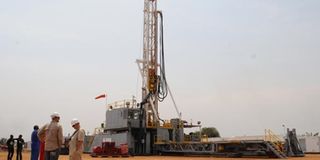Oil companies shy away from Ngaji block bid

A cross-section of oil production area in Hoima District. Some oil companies have shied away from bids in the Albertine Graben, citing smear campaigns by environmental groups. File photo
What you need to know:
No interest. The oil companies that recently submitted bids for prospective oil blocks in the Albertine Graben all shied away, citing smear campaigns by environmental groups.
Kampala. The seven oil companies that recently submitted bids for prospective oil blocks up for licensing in the Albertine Graben have shied away from the ecologically-sensitive Ngaji block in Lake Albert at Uganda-DR Congo border, according to officials.
Frank Mugisha, the acting commissioner in charge of exploration in the Petroleum Directorate, disclosed to Daily Monitor yesterday that “from the bids that were submitted there was none [interest] for Ngaji.”
“It was actually interesting although not surprising,” he said. “There was a lot of smear campaigns by various environmental groups [like Global Witness] and we think it was part of the reason.”
The Ngaji block, about 895 Km2 between the south western districts of Rukungiri and Kanungu, was among five other blocks up for grabs in the much awaited licensing round. Other blocks include Ngassa (410 Km2) in Hoima; Kanywantaba (344 Km2) and Turaco (425 Km2), in Ntoroko; Taitai & Karuka (565 Km2) in Buliisa, and Mvule (344 Km2) in Moyo/Yumbe.
The Ministry of Energy last week published a list of seven oil companies that bided for the oil blocks. The lineup included Armour Energy Ltd and Swala Energy Ltd from Australia, three from Nigeria—WalterSmith Petroman Oil Ltd, Oranto Petroleum International Ltd, and Niger Delta Petroleum Resources Ltd, Rift Energy Corporation from Canada, and Glint Energy LLC from USA. The companies were shortlisted from a pool of 16 companies that had initially expressed interest.
The government will now undertake evaluation of bids based on, among others, the companies’s work programme, technical and financial capacities, which the Energy ministry permanent secretary Kabagambe Kaliisa said, the exercise will be concluded with negotiations with the successful bidders, signing the Production Sharing Agreements (PSAs) and awarding of exploration licences by end of June.
The UK-based environmental conservationist group, Global Witness, last week while commending government for ensuring transparency in the licensing round had reiterated its concerns about “environmental risks posed by oil exploration to unique habitats including the Virunga World Heritage site, and the suitability of some of the oil companies under consideration” for Ngaji.
The Ngaji block covers half of Lake Edward, and part of Queen Elizabeth National Park. The area also forms part of the same ecosystem as Virunga – Africa’s oldest national park and a UNESCO World Heritage site.
Citing the example of another eco-sensitive Murchison Falls National Park at the northern end of the Albertine Rift Valley where French oil major Total E&P is currently involved, Mr Mugisha said had the Ngaji block been bided for, “of course we are conscious of the eco-system and there are mechanism for precaution like we are doing in Murchison. But there is another way,” he said. He said they would invoke the -PEDP-Act, 2013 which allows the Uganda National Oil Company (UNOC) to take over the exploration area or even licence it to the three international oil companies, UK’s Tullow Oil PLC, Total & China’s Cnooc, already operating in Uganda.
Governing law
The government in June last year incorporated the UNOC under the Companies Act, 2012 as a private company and wholly owned by government. According to the PEPD Act, the UNOC is charged with managing the country’s commercial interests in the oil sector, develop in depth expertise in the oil and gas industry, and to investigate and propose new upstream, midstream and downstream ventures initially locally but later internationally.




